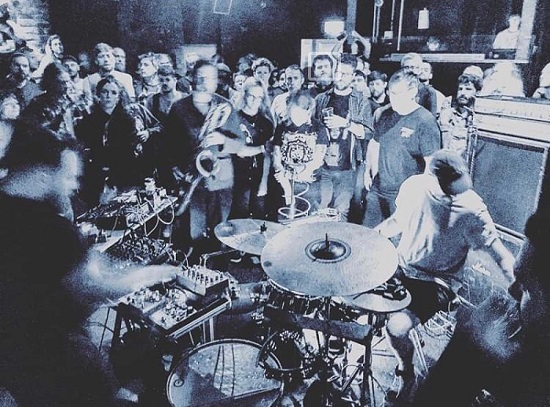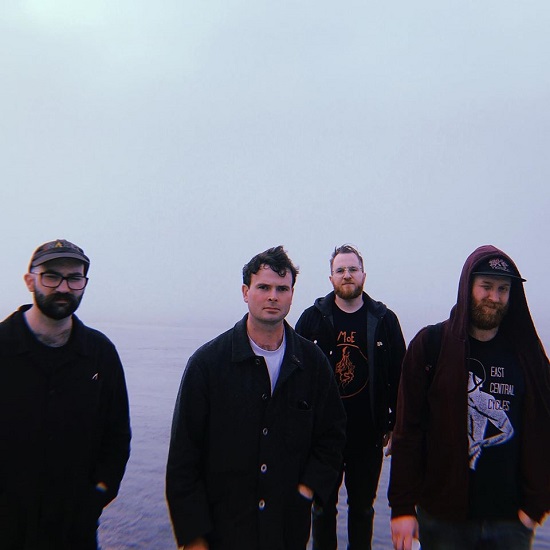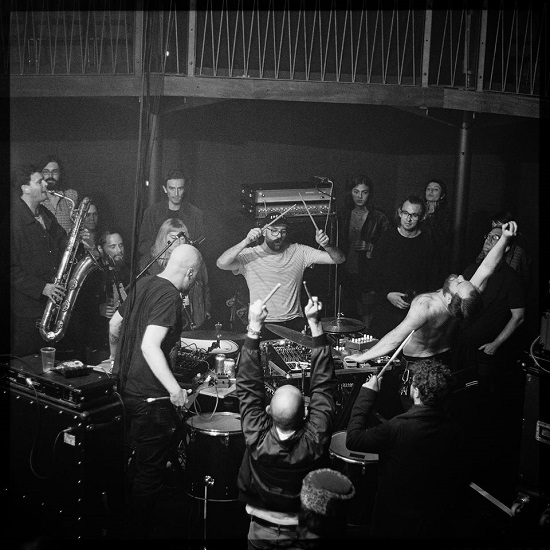Matt Cargill, leader of Sly & The Family Drone, speaks to tQ from an empty theatre. He usually works there as a tech manager, but with the site currently closed due to the coronavirus pandemic, he’s filling his time with some odd jobs and maintenance work, making the trip over from the converted warehouse and gig space in North London he shares with a number of other musicians, designers, and visual artists. There have been creatives living there for over a decade, and Cargill was a regular for shows by the likes of Pale Horse and Shield Your Eyes before he eventually moved in himself around five years ago. Today it’s something of a hub for that network of bands and artists sometimes known as New Weird Britain. During lockdown, Cargill and housemate Dan Jones aka UKAEA, whose deranged techno he’d hear from the bedroom below, pooled their resources for an almighty sprawling racket as Pocket Signs, for example.
The warehouse was also where Sly & The Family Drone recorded their latest album Walk It Dry (which premieres exclusively with tQ above), a record that sees the band digging deeper than ever in search of the most uncompromising, blasting music that it is possible to make, distilled this time into eight relatively short tracks rather than the vast sprawls that have characterised their former records. It’s the best example yet on tape of just how jaw-droppingly powerful the band can be. By extension it’s the perfect illustration of how special the music of that warehouse (and the other places just like it across the country) really is, an art form that survives and thrives against all odds.
The odds against Cargill have been more stacked than most over the last few years. Though they released the album Gentle Persuaders in 2019, Walk It Dry is also the first album the band have written and recorded following a horrific road accident that would irreparably alter his life. While touring as a member of the band Bruxa Maria, together with the band Silent Front for the latter’s ‘farewell tour’ in January 2018, the musicians were driving from Brighton to a show in Paris when their van was involved in a serious accident. The specific reason it crashed is hazy, but Cargill recalls the vehicle losing control, skidding, and rolling over. “I remember everybody really panicking for a moment, and the vehicle moving around for what seemed like forever. I was wearing a seatbelt, but I ended up out of the van, skidding on my back along the road. I thought the van was going to fall on me, I remember seeing it, thinking I was going to be crushed.”
Gareth Thomas, the drummer from Silent Front and a former member of the Family Drone, broke a vertebrae in his neck, while Cargill was left with his arm snapped “in half”, a broken collarbone, broken ribs, broken fingers, skin abrasions and a collapsed lung. With their injuries more serious than their bandmates’ the pair were rushed to one hospital, Le CHU Amiens-Picardie, while the rest were taken to another. “I didn’t really feel any pain [during the crash], from the adrenaline I guess,” Cargill says. “It was afterwards when I was in hospital having scans that was the most traumatic [part]. There was no one around, my French is terrible and I didn’t have my phone because everyone’s stuff had disintegrated in the crash. Eventually Gill [Dread] from Bruxa was able to get on Facebook or something and let people know what had happened.”
To make matters even worse, when Bruxa Maria’s Will Elvin returned to the scene of the crash to try and recover what gear might have survived, everything in the van had been stolen. “That was such a kick in the teeth,” Cargill sighs. “It was so horrible. There was 20 or 25 grand’s worth of backline when you add it all up, a lot of it was very specific stuff, gear that wasn’t worth a lot of money per se, but that couldn’t be replaced. To the person who ended up with that gear it doesn’t mean anything other than a quick bit of money, but people lost things that had sentimental value. Russ from Silent Front, his bass guitar was bought for him after his dad died.”

When news of the crash broke back in London, a crowdfunder was set up by Matt Ridout of the bands Casual Nun and Hominid Records in an effort to cover the considerable financial costs. At New River Studios in North London, the rehearsal space and studio at the heart of North London’s DIY music scene, a fundraising gig was held featuring USA Nails, UKAEA and more. Amidst the trauma, it threw into the spotlight just how much the musicians were loved. “You don’t realise at the time, when you’re ploughing whatever small area of whatever this scene is, but to actually see that response from people made us, or made me aware that it does mean something to people, and that’s an important thing to remember. Sometimes when you get disheartened about any creative endeavour, there’s still evidence there that people do care about it.” One of the priorities was to bring Cargill home from France via the private ambulance necessary to ensure his safety, and after two weeks in the French hospital he eventually returned home. Medical expenses were covered first, and the rest was divided among the musicians in an attempt to help replace the lost gear. Cargill still hasn’t spent his share.
Two and a half years on, the dust has not yet settled on potential insurance claims, and Cargill’s physical recovery is ongoing. He has had four medical procedures on his arm, including the insertion of a metal rod from his shoulder to his elbow which “basically didn’t work” and was replaced months later by a metal plate and screws, and an operation to repair the supraspinatus tendon that links the arm and the shoulder. Before coronavirus forced the closure of Britain’s gyms, Cargill was attending regular physiotherapy. “I turned up in my jeans, I’d never been in a gym in my life!” He’s also been working his way through the yoga course run by former WWF wrestler Diamond Dallas Page. Cargill’s arm will never fully regain its former movement and power, but the goal is to improve it as much as possible and to prevent it from prematurely degenerating. Suffering from elements of PTSD, he is also receiving psychotherapy. “Everyone who was in that crash is still dealing with it in a number of different ways. A lot of people ask things like ‘Is that all alright now?’, but actually everybody is still sort of ‘in it’. It will never be ‘all OK’.”
Perhaps unsurprisingly, Cargill says he had little interest in playing for some months after the crash. “I didn’t want to see or do anything. I didn’t care about music,” he continues. “I was focusing on my surgeries and trying to get better. Especially after having all our stuff nicked I just thought, ‘what’s the point if you’re going to be treated like that?’” It was thanks in part to the outpouring of love and support that the crash sparked that, by September, Cargill returned to rehearsals with Sly & The Family Drone. “When I was in hospital I couldn’t even get through it, reading people’s messages and seeing the fundraiser people did. It made me realise that it’s such an important thing to people who respond in that way, that our music has in some way reached them. That’s no small thing. It’s incredible to see people’s response, to think ‘they’re doing that for us.’ When I came around to the idea of wanting to play again, it was a sense of wanting to get out and share that with people, and to be with my best mates in the band. We did it with a newer appreciation and excitement.

“Instead of booking one show and seeing how it went, I ended up booking a whole tour and we did ten days around England,” Cargill recalls with a gentle laugh. The shows went well, although there were physical challenges. Sly & The Family Drone have built something of a considerable reputation on the energy and force of their live performances, but with Cargill still recovering from his injuries, “I can’t hit drums with as much power as before. I’m not carrying as many heavy amps or climbing around. I did feel that the dynamic changed in some way. I didn’t have a lot of confidence. I felt like I wasn’t giving a good account of the band if I wasn’t giving a good performance.” The act of travelling from one show to a next also presented difficulties. “I still feel quite anxious in the van if its on the motorway, if it’s moving around or swerving or breaking…”
Touring so soon after the accident was not easy, but in the long run it was beneficial, he says. “It was important to remind myself why I wanted to do it, what I enjoyed about music-making, touring and interacting with people. It reminded me of those early touring experiences, of before I’d toured in a band and was going away with friends’ bands.” By being forced to rebuild their live show from the ground up, the Family Drone in fact found ways to push things even further forwards. “I feel like we’ve become a better band playing together, we home in on each other and we listen and we play a lot better generally. There’s an element of anxiousness and self-doubt, but I do feel like if you start getting into a situation where you’re responding to what people expect, that’s probably not a bad thing.”
That newfound relationship between the musicians in the Family Drone – currently consisting of Ed Dudley, Kaz Buckland and James Allsop – is one of the main reasons their new record is so brilliant. They recorded it off the back of that first tour, aiming (and succeeding) to capture that feeling of being “energised and inspired” after a run of shows. By releasing eight shorter tracks, rather than the three or four sprawling giants that would usually populate their records, Walk it Dry is actually more powerful still. A refined and concentrated blast of the band’s signature bone-shaking power. “The intention was to mix it up a bit, and to try different setups and formations,” Cargill says. “So it’s still the same four of us, but we’ve changed who might be going through each other or taking a signal from something. I might have control of some of the drum signals, or they would take a signal from the sax when it used to be one person controlling that process. There was a lot of swapping around and playing with duos and it was quite intuitive. I think we’re all playing better together on it. There’s some really nice interplay between those duos, I think.”
There was always a cathartic element to the kind of music Cargill and others in the experimental and DIY music scene perform, but the therapeutic power of unrefined noise now feels more formidable than ever. “I haven’t really thought loads about it, but there are many people in bands in our scene who have experienced trauma, or other health issues, physically or mentally, and I think the application of playing, particularly with Sly, it is such a cathartic release. I like to be in the crowd with people up close [when I perform] so they can share that. Personally it feels like that’s what I want to put my time and energy into. Like I said earlier, for a long time [after the crash] I didn’t, but you know, what else are you going to do? I don’t really have another skill, I don’t know where else to focus my energy, so it feels like it’s important to carry on. Hopefully anyway, who knows when we’ll next be able to?”

For all the Family Drone have overcome, it feels particularly brutal that the coronavirus pandemic has all but obliterated their ability to perform the new record on tour, and cast serious the very existence of live music in the short and long term future in Britain. “Sometimes you’re inspired and feel like it’ll all be over soon, and loads of people continue like everything’s fine when clearly it isn’t, but there’s 40,000 people dead,” he says grimly. “Everyone I know who’s a musician or is involved in a venue or is a freelance person, their industry has just disappeared. I really don’t know how it’s going to recover. I’m just trying to remain hopeful that there will be a time when festivals and big gatherings can happen. It’s kind of terrifying to think that can disappear, because it’s such an important thing for people’s lives, not just for a musician but for any person who enjoys the arts or theatre, those creative outlets have just stopped, people need those spaces and those events to have an emotional response, it’s a massive part of people’s lives. It’s quite hard to imagine a world where that doesn’t exist and at the moment it doesn’t.”
Perhaps the only hope for the future is to look back at the past, and at the way experimental music has continued to exist in a country whose very socio-political systems seem primed against it. “I saw the other day that The Brixton Windmill costs something like 95 grand a week to maintain, how is that even legal?” Cargill asks. “I suppose the one thing you take from it and are kind of encouraged by is how DIY underground stuff emerges and can exist with minimal financial backing, and that maybe people will reconsider the way in which they operate and support other people, that new things might emerge, be that non-traditional venues or alternative spaces or something like that. I guess underground things always have done and that’s inspiring and hopeful that that could happen again. I just hope that it will encourage people to flourish in a way that encourages each other will that there is a way to create venues out of nothing. They’re always the most interesting spaces, everyone prefers to play in those because they are outside of the mainstream and generally it means people do things properly and treat people better. It’s a better way to do things.”
Walk It Dry by Sly & The Family Drone is out on July 17 via Love Love Records. Today (July 3) all proceeds from pre-orders on Bandcamp go directly to the band as part of the site’s fee-waive initiative.




